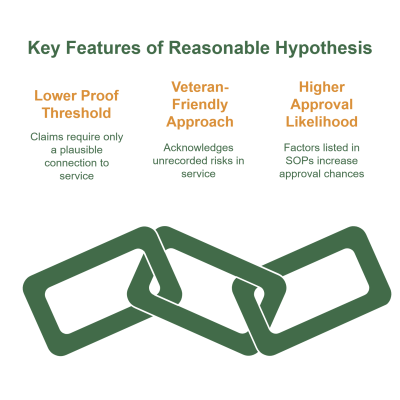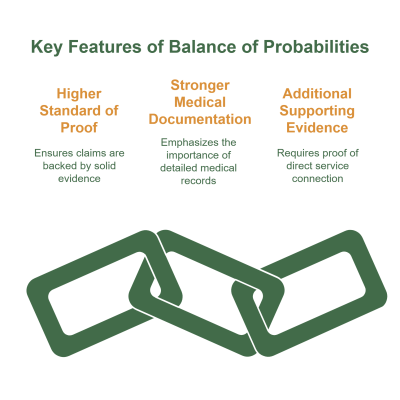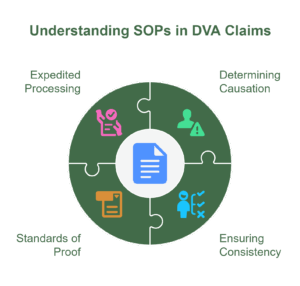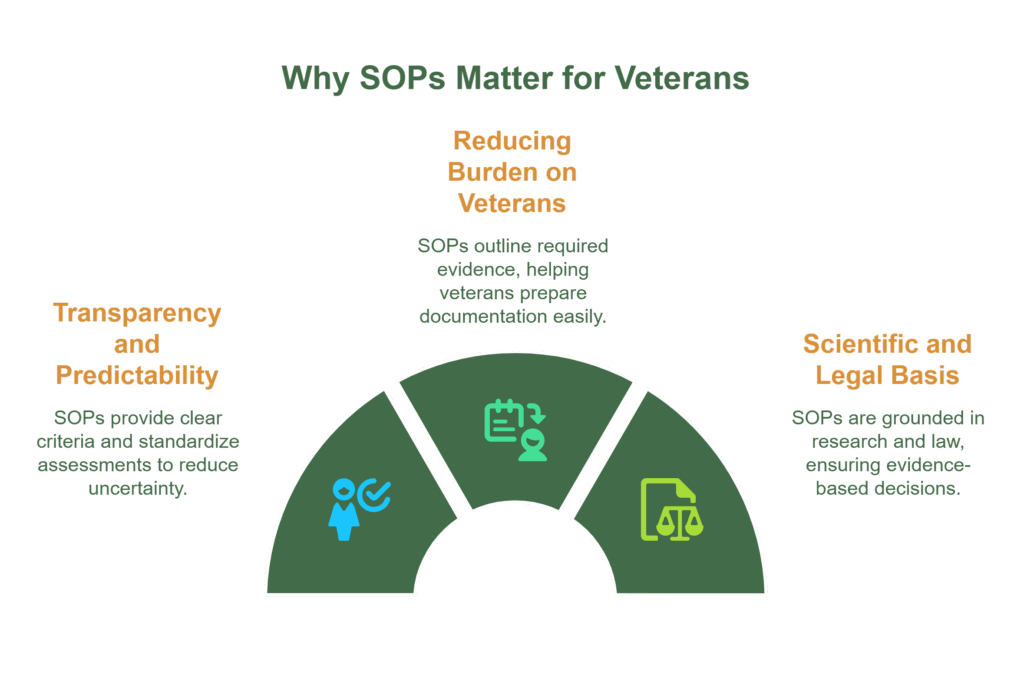When it comes to compensation claims for veterans, fairness and consistency are essential. But how do decision-makers determine whether a veteran’s medical condition is linked to their military service? This is where Statements of Principles (SOPs) come into play.
Key takeaways
- SOPs make the claims process predictable and easier to navigate.
- Veterans benefit from clear evidence requirements, reducing unnecessary burdens.
- Decisions are based on medical-scientific research, ensuring fairness and legitimacy.
- Even if a condition is not covered by an SOP, veterans still have options for filing a claim.
What Are Statements of Principles (SOPs)?
Statements of Principles (SOPs) are legally binding legislative instruments developed by the Repatriation Medical Authority (RMA). They set out the medical and scientific criteria needed to establish a link between a veteran’s condition and their military service. SOPs form the foundation for assessing compensation claims under the Veterans’ Entitlements Act 1986 (VEA) and the Military Rehabilitation and Compensation Act 2004 (MRCA).
If you’re applying through DVA, understanding SOPs can make a real difference. They outline the level of evidence you’ll need and help ensure decisions are fair and consistent. Without this framework, claim outcomes would risk inconsistency, delays, and uncertainty about what’s needed to prove a service connection.
SOPs help establish causation by outlining:
- The specific factors required to connect a medical condition to military service.
- The standard of proof necessary varies depending on the type of service.
- Any service-related exposures or injuries that could contribute to the condition.
Each SOP is based on rigorous medical and scientific research, ensuring fair and consistent decision-making. The RMA regularly updates SOPs using peer-reviewed studies, clinical research, and expert medical input to reflect the latest scientific understanding.
Importantly, SOPs are legally binding—decision-makers must apply them when evaluating claims. This ensures:
- Transparency in how claims are assessed.
- Faster claim processing through standardised criteria.
- Fairness by applying the same medical principles to all veterans.
Understanding how SOPs work can help you build a stronger DVA claim, but the process can be confusing. At VetComp, we break it down for you, explain what matters, and help you gather the right evidence. We’re here to make it simpler and less stressful.
SOP Factors: The Two Standards of Proof
SOPs are not a one-size-fits-all system. Instead, they apply two distinct standards of proof depending on the type of service a veteran engaged in. These standards ensure fairness in claim assessments by adjusting the burden of proof based on the likelihood of exposure to service-related conditions.
Reasonable Hypothesis (RH): A Lower Threshold for Warlike and Non-Warlike Service
The Reasonable Hypothesis (RH) standard applies to veterans who served in warlike or non-warlike operations. Given the unpredictable and high-risk nature of these environments, the burden of proof is intentionally lower.
Key Features of RH:
- Lower threshold for proof: The claim only needs to establish a plausible connection between the condition and service, rather than absolute certainty.
- Veteran-friendly approach: recognises that wartime and operational service may expose personnel to numerous risks that cannot always be documented in medical records.
- Greater likelihood of claim approval: If an SOP lists a factor that could reasonably be connected to warlike service, and the claimant meets that factor, the condition is considered service-related.
For example, a veteran who served in a war zone and later developed PTSD may not need detailed medical records from their time in service. Under the RH standard, simply having served in a high-stress, warlike environment could be enough to link their condition to service.

Balance of Probabilities (BOP): A Higher Standard for Peacetime and Eligible War Service
For peacetime or eligible war service, claims are assessed under the Balance of Probabilities (BOP) standard. This means that for a claim to be approved, it must be more likely than not that military service caused the condition.
Key Features of BOP:
- Higher standard of proof: The connection between the service and the condition must be supported by solid evidence.
- Requires stronger medical documentation: Medical records, expert opinions, and service history play a more critical role.
- Claims may require additional supporting evidence: The claimant must show that their condition is directly related to military service, rather than other life factors.
For example, a veteran who served during peacetime and later develops hearing loss would need to show evidence that their condition resulted from prolonged exposure to loud environments, specifically during service, rather than due to aging or post-service employment.

Why These Distinctions Matter
The difference between RH and BOP affects how claims are processed and approved. Veterans who served in combat zones or hazardous operations are entitled to a lower burden of proof, acknowledging the challenges in documenting exposures during wartime. Meanwhile, those with peacetime service must present stronger evidence to support their claims, reflecting the lower risk levels associated with non-warlike service.
By understanding these distinctions, veterans can better prepare their claims and gather the right evidence based on their service and the relevant SOP standard.
We know it’s not always easy to navigate on your own. That’s why our DVA advocates do all the hard work for you. It’s what we do every day.
How SOPs Are Applied in DVA Compensation Claims
SOPs help guide how the DVA assesses compensation claims, giving structure to what can otherwise be a complex process. By setting out clear criteria and evidence requirements, they help deliver fairer, more consistent decisions for all veterans.

Determining Causation: Proving the Link to Military Service
At the heart of every compensation claim is the question: Did military service contribute to or cause the medical condition?
SOPs define specific factors that must be met to establish this link. These factors vary depending on the medical condition but might include:
- Exposure to specific environmental hazards (e.g., asbestos, chemicals, combat stress)
- Physical demands of military duties (e.g., heavy lifting, repetitive strain)
- Timeframes within which symptoms must develop after service
For a claim to succeed, the claimant must demonstrate that at least one SOP factor applies to their case. If an SOP lists “exposure to military-grade explosives” as a factor for hearing loss, and a veteran’s service record confirms regular exposure, their claim is more likely to be approved.
How SOPs Improve Consistency:
- Standardised assessments: Every claim is assessed using the same medically supported criteria, ensuring fairness.
- Eliminates subjectivity: Reduces reliance on personal opinions of medical professionals and decision-makers.
- Predictable outcomes: Veterans and advocates can better understand what to expect in the claims process.
Without SOPs, similar cases could result in different outcomes depending on the medical opinions involved. By following SOP guidelines, decision-makers apply the same rules to all claimants, promoting fairness and equality.
Standards of Proof in Compensation Claims
SOPs dictate which standard of proof applies based on the veteran’s service category:
- Reasonable Hypothesis (RH): Used for warlike/non-warlike service, favouring the claimant.
- Balance of Probabilities (BOP): Used for peacetime service, requiring stronger evidence.
Why This Matters in Claim Evaluations:
- RH claims are easier to establish, allowing veterans to benefit from the presumption that their condition is linked to hazardous service.
- BOP claims require veterans to prove their case with greater certainty, making thorough medical documentation essential.
Veterans should align their evidence-gathering efforts with the standard of proof that applies to their specific type of service.
Expedited Processing for Certain Conditions
SOPs also play a role in streamlining claims for conditions with well-established links to military service.
When Can Claims Be Expedited?
- If a veteran’s profile matches known service-related exposures or risk factors.
- If a condition is explicitly listed in SOPs as having a strong association with military service.
- If the veteran’s service history aligns with previously approved claims of the same nature.
For example, a veteran who served in Vietnam and later develops Type 2 Diabetes may have their claim expedited due to established links between Agent Orange exposure and diabetes. Similarly, conditions like hearing loss in artillery personnel or PTSD in combat veterans may qualify for faster processing.
Examples of Conditions That May Be Fast-Tracked:
- PTSD for combat veterans
- Lung diseases for veterans exposed to toxic chemicals
- Musculoskeletal injuries for infantry and heavy-duty roles
By using SOPs as a reference, DVA can approve claims more quickly when clear service-related connections exist, reducing wait times and stress for veterans.
📩 Navigating compensation claims on your own can be overwhelming. Our DVA advocates simplify the process by handling the evidence, paperwork, and requirements for you. Instead of second-guessing what’s needed, let us guide you through it.
Why SOPs Matter for Veterans
SOPs are essential in the DVA compensation system, ensuring fair, consistent, and evidence-based decision-making. By outlining clear eligibility criteria, they provide transparency, reduce uncertainty, and make the claims process more predictable.
Transparency and Predictability
Veterans often face uncertainty when applying for compensation. SOPs eliminate confusion by:
- Defining clear medical criteria for service-related conditions.
- Standardising assessments, ensuring uniformity across claims
- Allowing veterans to review requirements in advance reduces reliance on subjective opinions.
Reducing the Burden on Veterans
The claims process can be overwhelming. SOPs help by:
- Clearly outlining required medical and service-related evidence.
- Allowing veterans to gather relevant documentation upfront.
- Helping medical professionals align their supporting evidence with SOP factors.
📩We can help with all of this, even with finding a DVA-friendly GP. Book a free consultation with us today to find out more.
Scientific and Legal Basis
SOPs are grounded in rigorous medical research and mandated by law under the VEA and MRCA, ensuring:
- Evidence-based decisions, backed by peer-reviewed studies.
- Legal consistency, preventing bias and arbitrary claim rejections.
- Fair treatment for all veterans, regardless of location or background.

What If a Condition Isn’t Covered by an SOP?
Veterans can still file claims for non-SOP conditions, but the process is more subjective and requires more evidence. These claims require:
- Detailed medical documentation linking the condition to service.
- Specialist assessments and expert opinions.
- Longer processing times, as decisions are made case by case.
For example, a veteran with a rare neurological condition may need detailed specialist reports and evidence of exposure during service to support their claim. As medical research progresses, new SOPs are introduced to cover emerging conditions.
By providing clear criteria, SOPs help simplify the claims process and support fair, consistent outcomes for veterans.
Contact us today if you believe you are entitled to compensation as a result of your service.
SOPs Are the Foundation of a Fair and Reliable Compensation System
SOPs help make the DVA claims process fair and consistent. They set the rules for how certain health conditions can be linked to your time in service, making sure everyone is assessed by the same standards.
If you’re a veteran applying for compensation, understanding how SOPs work – and what kind of evidence you need – can really help your claim go smoothly. But we know it’s not always easy to make sense of it all.
That’s where our team at VetComp comes in. We take care of the hard stuff, explain things clearly, and help you build a strong case from the start. You focus on your health – we’ll handle the paperwork.
📩 Get in touch with one of our experienced DVA Advocates today.
FAQs
We’ve gathered our most commonly asked questions here, so you can feel informed, at ease, and ready to take the next step toward the support and benefits you deserve.
What are Statements of Principles (SOPs), and why do they matter for veterans?
SOPs are legislative instruments created by the Repatriation Medical Authority (RMA) to define the medical conditions that can be linked to military service. They ensure fair and consistent decision-making in compensation claims by outlining specific causation factors and evidentiary requirements.
How do SOPs impact my DVA compensation claim?
SOPs standardize the assessment process, meaning your claim is reviewed based on clear, medically-backed criteria. If your condition meets at least one of the factors listed in an SOP, your claim is more likely to be approved efficiently without excessive documentation or subjective interpretation.
What’s the difference between ‘Reasonable Hypothesis’ (RH) and ‘Balance of Probabilities’ (BOP)?
- Reasonable Hypothesis (RH) applies to warlike and non-warlike service and has a lower burden of proof, meaning the connection between service and the condition only needs to be reasonably plausible.
- Balance of Probabilities (BOP) applies to peacetime service and requires a higher level of evidence, meaning the condition must be more likely than not caused by military service.
What happens if my condition is not covered by an SOP?
If an SOP does not exist for your condition, you can still file a claim, but the assessment will rely on individual medical evidence rather than predefined SOP factors. You’ll need to provide:
✅ Specialist medical reports
✅ Service-related exposure records
✅ Scientific studies or case law supporting the link between service and your condition
When working with us, we guide you through the process and make sure you have all the evidence you need, rather than trying to do it yourself.
How can SOPs speed up the processing of my claim?
SOPs allow fast-tracking of claims when a veteran’s service history aligns with an SOP-listed factor. This means:
- If your service exposure is a recognised risk factor, your claim may be approved without lengthy investigations.
- Common service-related conditions (e.g., PTSD, hearing loss, or respiratory illnesses) often benefit from streamlined processing under SOP rules.
Can SOPs be updated or changed?
Yes. The RMA continuously reviews SOPs based on new medical research and emerging health trends. If scientific evidence evolves, SOPs can be updated, amended, or new ones can be created to reflect current medical understanding. Veterans can check the DVA and RMA websites for the latest SOP updates.
How do I find out if an SOP applies to my condition?
You can check the RMA website or the DVA’s CLIK database, which lists all current SOPs and their applicable factors. If you’re unsure, our advocates can help you determine whether an SOP applies to your case.
Where can I get help with my compensation claim?
If you need assistance with your claim, you can seek help from:
🔹 Department of Veterans’ Affairs (DVA) – Official resources and guidance
🔹 VetComp – we are here for all your compensation needs. Book in a free consultation today



